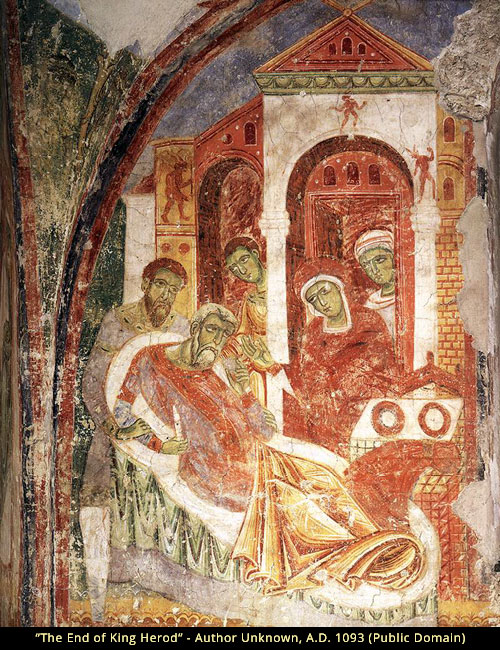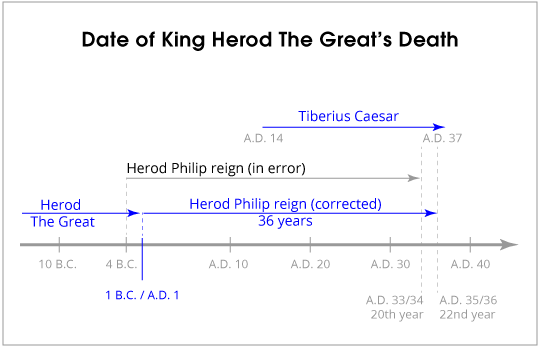Bible Question:
When did King Herod the Great reign and die?
Bible Answer:
The New Testament refers to four different King Herods (Matthew 2:1; Luke 3:1; Acts 12:1-24; Acts 25:13-26:32).[1] This Q&A is concerned with the first Herod mentioned in Scripture. He is King Herod the Great. Our question is, “When did King Herod the Great reign and die?”

The Five King Herods
There are five King Herods in the New Testament.
Herod The Great
The first King Herod appears in Matthew 2:1 when we are told,
Now after Jesus was born in Bethlehem of Judea in the days of Herod the king, magi from the east arrived in Jerusalem, saying, Where is He who has been born King of the Jews? For we saw His star in the east and have come to worship Him.” Matthew 2:1-2 (NASB)
Historical records identify the Herod in this passage as Herod the Great.[2] He was the ruler of Judea at this time. He appears in the following verses in the New Testament: Matthew 2:1, 3, 7, 12, 13, 16, 19, 22 and Luke 1:5.
The Other Herods
Herod Antipas, the Tetrarch of Galilee, appears next in multiple places throughout the New Testament (Matthew 14:1-6; Mark 6:14-29; Luke 3:1, 19-20; 9:7, 9; 13:31; 23:7-15; Acts 4:27; 12:1-21; 13:1).
Herod Philip, tetrarch of the region of Ituraea and Trachonitis, appears only in Luke 3:1.
Herod Agrippa I appears in the book of Acts (Acts 12:1-24) and Herod Agrippa II appears near the end of Acts (Acts 25:13-26:32). The Acts 25 account in the NASB refers to Herod Agrippa II using just the name Agrippa.

Length and Death of Herod the Great
Most historians today depend upon the work of Emil Schurer who wrote in A.D. 1890 that Herod the Great died in 4 B.C. He also provides a detailed, heavily footnoted seventeen pages accounting for the timeline of Herod the Great’s reigned from 37 B.C. to 4 B.C.[4] However, Finegan has provided a table similar to one developed by Schurer that shows Herod the Great died in 2/1 B.C.[5] Then later in his discussion, he demonstrates that Herod did not die in 4 B.C. but in 1 B.C.[6] His detailed information is impressive. In the following quote, he demonstrates that Herod Philip died in the twenty-second year of Tiberius (A.D. 35/36), rather in the twentieth year. This shifts the death of Herod the Great from 4 B.C. to 1 B.C. and in turn shifts the birth of Christ to 3/2 B.C.
. . . the currently known text of Josephus’ Ant. 18.106 states that [Herod] Philip died in the twentieth year of Tiberius (A.D. 33/34 . . .) after ruling for thirty-seven years. This points to Philips’ ascension at the death of Herod in 4 B.C. (4 years B.C. + 33 years A.D. = 37 years) . . Florian Riess reported that the Franciscan monk Molkenbuhar claimed to have seen a 1517 Parisian copy of Josephus and an 1841 Venetian copy in each of which the text read “the twenty-second year of Tiberias.” The antiquity of this reading has now been abundantly confirmed. In 1995 David W. Beyer reported to the Society for Biblical Literature his personal examination in the British Museum of forty-six editions of Josephus’ Antiquities published before 1700 among which twenty-seven texts, all but three published before 1544 read “twenty-second year of Tiberius,” while not one single edition published prior to 1544 read “twentieth year of Tiberius.” Likewise, in the Library of Congress five more editions read the twenty-second year,” while none prior to 1544 records the “twentieth year.” It was also found that the oldest versions of the text give variant lengths of reign for Philip of 32 to 36 years. But if we still allow for a full thirty-seven year reign, then “the twenty-second year of Tiberius” (A.D. 35/36) points to 1 B.C. (1 year B.C. + 36 years A.D. = 37 B.C.) as the year of death of Herod. This is therefore the date which is accepted in the present book. Accordingly, if the birth of Jesus was two years or less before the death of Herod in 1 B.C., the date of birth was in 3 or 2 B.C., presumably precisely in the period 3/2 B.C., so consistently attested by the most credible early church fathers . . .[7]
Conclusion:
Therefore, it is concluded that King Herod the Great reigned from 37 B.C. to 1 B.C. This suggests that Christ was born in 3/2 B.C.
References:
1. H. F. Hoehner. “Herod” The Zondervan Pictorial Encyclopedia of the Bible. Zondervan Publishing. 1977. vol. 3, p. 127.
2. Ibid.
3. Emil Schurer. Cory A History of the Jewish People in the Time of Jesus Christ. Hendrickson Publishers. 1890. First Division, vol 1, p. 60.
4. Ibid. pp. 400-416.
5. Finegan, Jack. Handbook of Biblical Chronology. Hendrickson. Grand Rapids. 1998., para. 513, p. 298-299.
6. Ibid., para. 518, p. 301.
7. Ibid.
Suggested Links:
Prophecy of Daniel’s Seventy Weeks – Daniel 9:24-25Can we determine the date of Christ’s birth from the visit of the magi?
Is there secular evidence Herod killed babies under the age of two?
Children Murdered
Fables of Christmas
How old was Jesus when the wise men found Him?
Was Jesus born on December 25? — Testimony of Historians